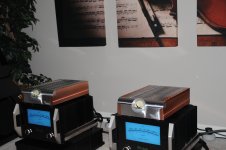It should be noted that the term Recording or Mastering engineer is a bit of a stretch - these individuals are NOT real engineers as having gone to an intensive mathematics based university 120 credit degree program. I always thought arguments over CD and vinyl were pointless. First it is far more about the recording on each format than the format itself. Even if people concede that the CD format is technically better (or SACD) as a format - that doesn't actually mean the music will sound more real or "better" than the LP. There are plenty of examples where the CD version (perhaps via remastering) sounds much superior to the LP - but plenty of LPs were badly transferred to CD, if they were transferred at all. Therefore, why not buy both formats? Then play the album on whichever medium sounds better. You win either way and then the inane arguments of CD versus vinyl go away.
Vinyl may bring some people a more rewarding listening experience from tertiary factors - which can enhance their experience making it seem very much that vinyl is a lot better. Many things influence perceptions. Vinyl is a more tactile medium and it requires the user to pay more attention to things. Just playing the album requires more effort, there is larger cover art. Owners spend more time taking care of the vinyl, cleaning them tweaking cartridges, perhaps taking a log of how many hours they have put on their stylus, and fidgeting with tone arms, zero-stat guns, cleaning machines, levelers, dusting them, buying special sleeves or mats or clamps etc. The CD player is push the open button, drop cd in, push close or play - and that's it. Computer downloaded music is even less hands on and I would suggest focus the listener less. These may be additive reasons why Vinyl often seems to sound better. One's attention is held more to it.

